Acute Care Mental Health: Assessment, Formulation, and Treatment
VerifiedAdded on 2022/12/27
|11
|2900
|59
AI Summary
This document provides a comprehensive study on acute care mental health, focusing on the assessment, formulation, and treatment of mental illness. It includes a case study of Mr. Peter, exploring the social and psychological factors involved. The document also covers symptoms, physical assessments, and various treatment options for mental illness.
Contribute Materials
Your contribution can guide someone’s learning journey. Share your
documents today.
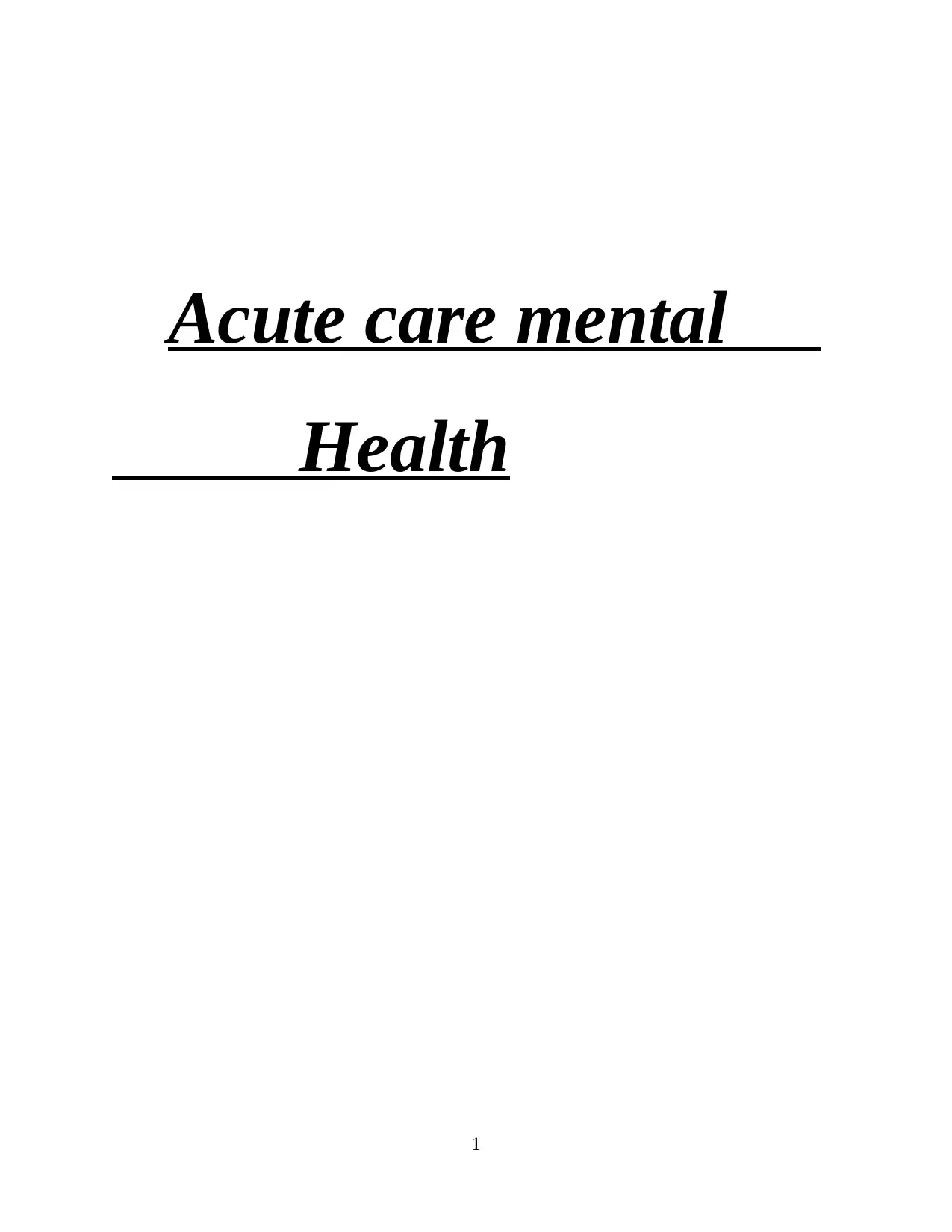
Acute care mental
Health
1
Health
1
Secure Best Marks with AI Grader
Need help grading? Try our AI Grader for instant feedback on your assignments.
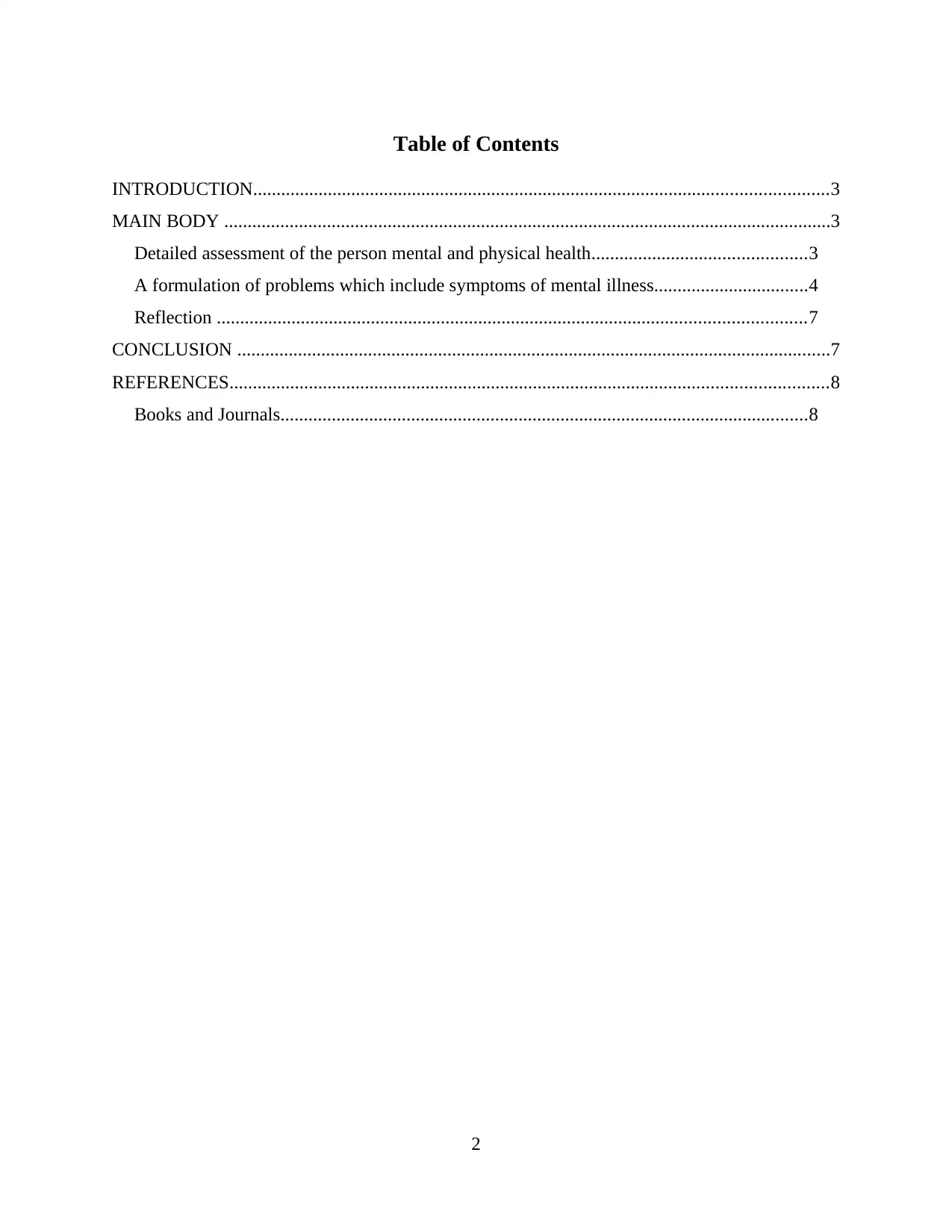
Table of Contents
INTRODUCTION...........................................................................................................................3
MAIN BODY ..................................................................................................................................3
Detailed assessment of the person mental and physical health..............................................3
A formulation of problems which include symptoms of mental illness.................................4
Reflection ..............................................................................................................................7
CONCLUSION ...............................................................................................................................7
REFERENCES................................................................................................................................8
Books and Journals.................................................................................................................8
2
INTRODUCTION...........................................................................................................................3
MAIN BODY ..................................................................................................................................3
Detailed assessment of the person mental and physical health..............................................3
A formulation of problems which include symptoms of mental illness.................................4
Reflection ..............................................................................................................................7
CONCLUSION ...............................................................................................................................7
REFERENCES................................................................................................................................8
Books and Journals.................................................................................................................8
2
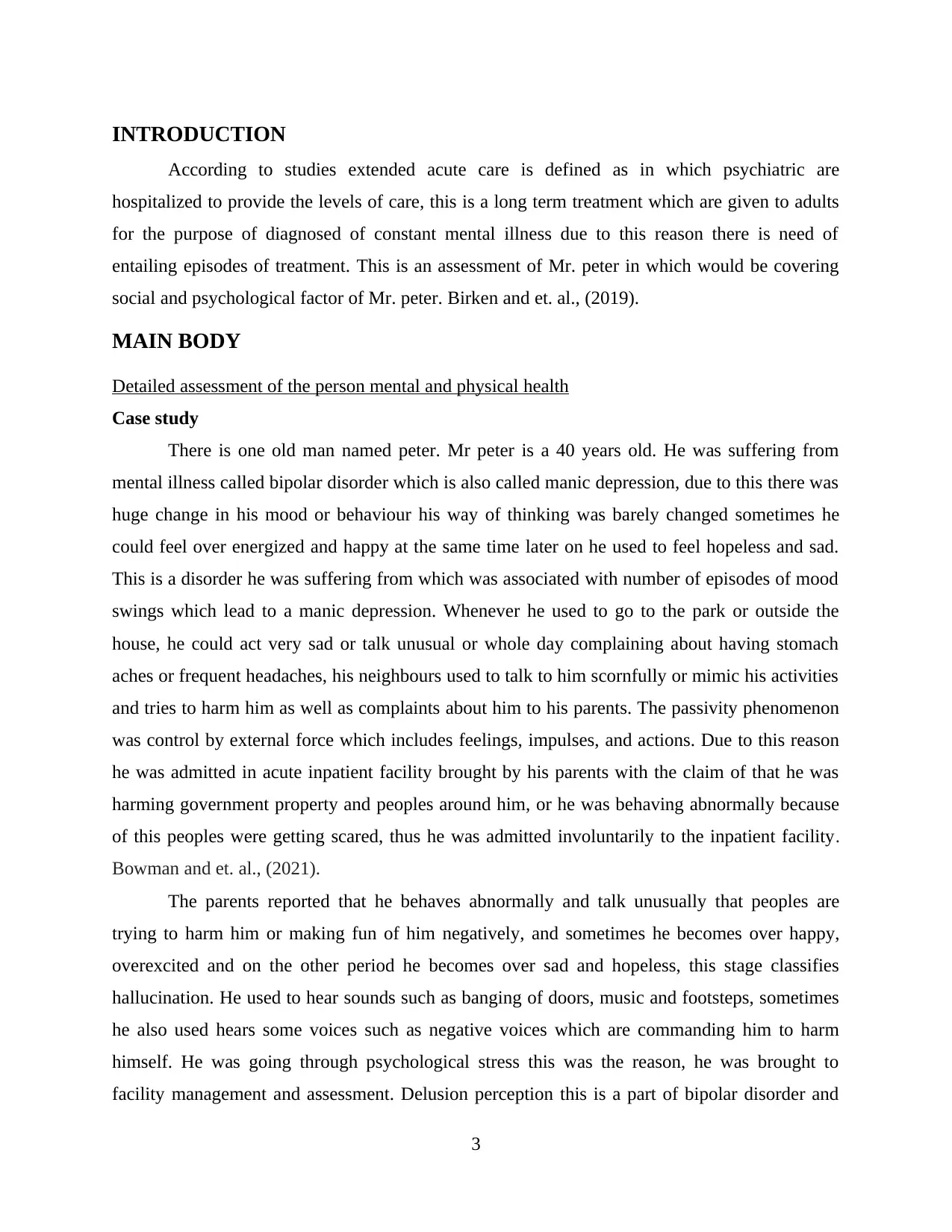
INTRODUCTION
According to studies extended acute care is defined as in which psychiatric are
hospitalized to provide the levels of care, this is a long term treatment which are given to adults
for the purpose of diagnosed of constant mental illness due to this reason there is need of
entailing episodes of treatment. This is an assessment of Mr. peter in which would be covering
social and psychological factor of Mr. peter. Birken and et. al., (2019).
MAIN BODY
Detailed assessment of the person mental and physical health
Case study
There is one old man named peter. Mr peter is a 40 years old. He was suffering from
mental illness called bipolar disorder which is also called manic depression, due to this there was
huge change in his mood or behaviour his way of thinking was barely changed sometimes he
could feel over energized and happy at the same time later on he used to feel hopeless and sad.
This is a disorder he was suffering from which was associated with number of episodes of mood
swings which lead to a manic depression. Whenever he used to go to the park or outside the
house, he could act very sad or talk unusual or whole day complaining about having stomach
aches or frequent headaches, his neighbours used to talk to him scornfully or mimic his activities
and tries to harm him as well as complaints about him to his parents. The passivity phenomenon
was control by external force which includes feelings, impulses, and actions. Due to this reason
he was admitted in acute inpatient facility brought by his parents with the claim of that he was
harming government property and peoples around him, or he was behaving abnormally because
of this peoples were getting scared, thus he was admitted involuntarily to the inpatient facility.
Bowman and et. al., (2021).
The parents reported that he behaves abnormally and talk unusually that peoples are
trying to harm him or making fun of him negatively, and sometimes he becomes over happy,
overexcited and on the other period he becomes over sad and hopeless, this stage classifies
hallucination. He used to hear sounds such as banging of doors, music and footsteps, sometimes
he also used hears some voices such as negative voices which are commanding him to harm
himself. He was going through psychological stress this was the reason, he was brought to
facility management and assessment. Delusion perception this is a part of bipolar disorder and
3
According to studies extended acute care is defined as in which psychiatric are
hospitalized to provide the levels of care, this is a long term treatment which are given to adults
for the purpose of diagnosed of constant mental illness due to this reason there is need of
entailing episodes of treatment. This is an assessment of Mr. peter in which would be covering
social and psychological factor of Mr. peter. Birken and et. al., (2019).
MAIN BODY
Detailed assessment of the person mental and physical health
Case study
There is one old man named peter. Mr peter is a 40 years old. He was suffering from
mental illness called bipolar disorder which is also called manic depression, due to this there was
huge change in his mood or behaviour his way of thinking was barely changed sometimes he
could feel over energized and happy at the same time later on he used to feel hopeless and sad.
This is a disorder he was suffering from which was associated with number of episodes of mood
swings which lead to a manic depression. Whenever he used to go to the park or outside the
house, he could act very sad or talk unusual or whole day complaining about having stomach
aches or frequent headaches, his neighbours used to talk to him scornfully or mimic his activities
and tries to harm him as well as complaints about him to his parents. The passivity phenomenon
was control by external force which includes feelings, impulses, and actions. Due to this reason
he was admitted in acute inpatient facility brought by his parents with the claim of that he was
harming government property and peoples around him, or he was behaving abnormally because
of this peoples were getting scared, thus he was admitted involuntarily to the inpatient facility.
Bowman and et. al., (2021).
The parents reported that he behaves abnormally and talk unusually that peoples are
trying to harm him or making fun of him negatively, and sometimes he becomes over happy,
overexcited and on the other period he becomes over sad and hopeless, this stage classifies
hallucination. He used to hear sounds such as banging of doors, music and footsteps, sometimes
he also used hears some voices such as negative voices which are commanding him to harm
himself. He was going through psychological stress this was the reason, he was brought to
facility management and assessment. Delusion perception this is a part of bipolar disorder and
3
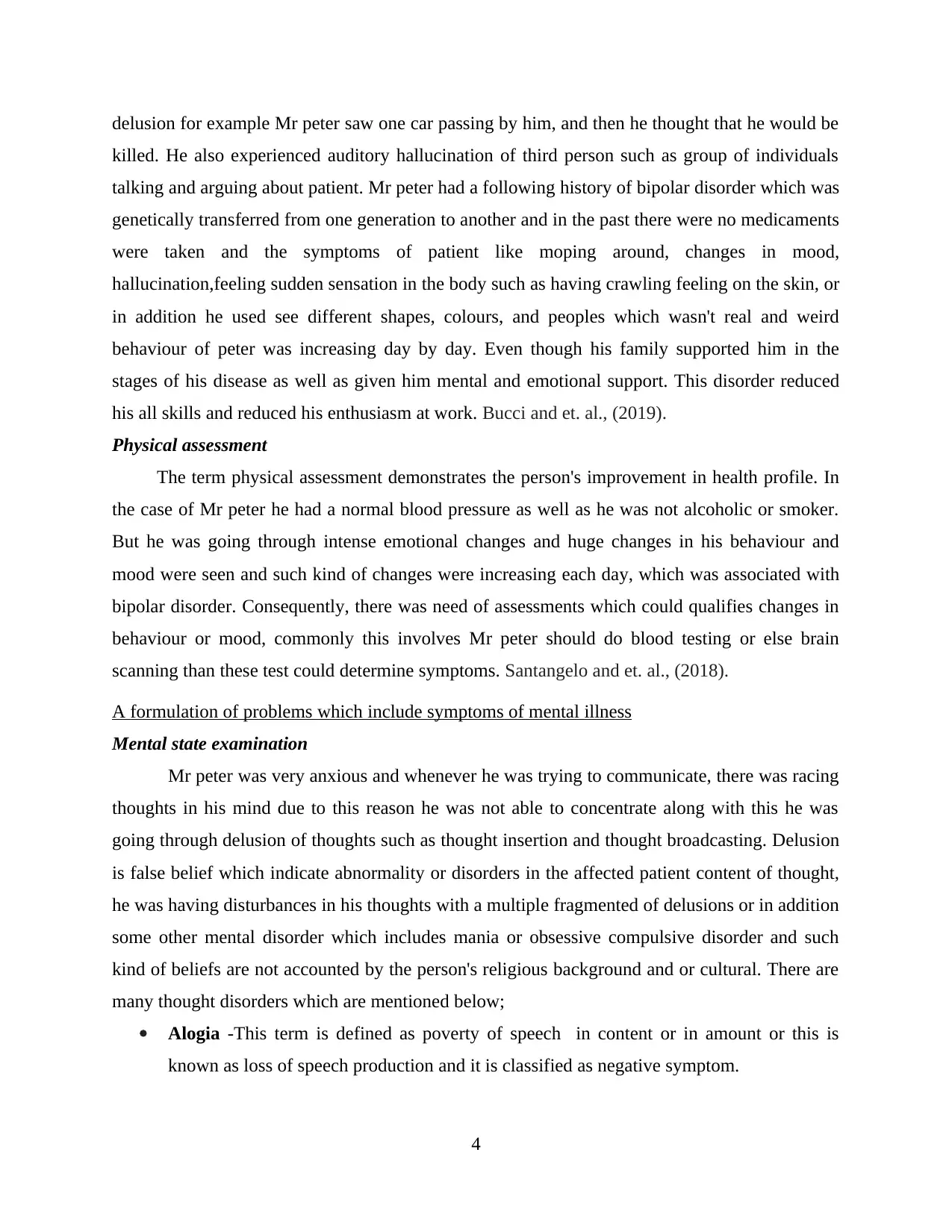
delusion for example Mr peter saw one car passing by him, and then he thought that he would be
killed. He also experienced auditory hallucination of third person such as group of individuals
talking and arguing about patient. Mr peter had a following history of bipolar disorder which was
genetically transferred from one generation to another and in the past there were no medicaments
were taken and the symptoms of patient like moping around, changes in mood,
hallucination,feeling sudden sensation in the body such as having crawling feeling on the skin, or
in addition he used see different shapes, colours, and peoples which wasn't real and weird
behaviour of peter was increasing day by day. Even though his family supported him in the
stages of his disease as well as given him mental and emotional support. This disorder reduced
his all skills and reduced his enthusiasm at work. Bucci and et. al., (2019).
Physical assessment
The term physical assessment demonstrates the person's improvement in health profile. In
the case of Mr peter he had a normal blood pressure as well as he was not alcoholic or smoker.
But he was going through intense emotional changes and huge changes in his behaviour and
mood were seen and such kind of changes were increasing each day, which was associated with
bipolar disorder. Consequently, there was need of assessments which could qualifies changes in
behaviour or mood, commonly this involves Mr peter should do blood testing or else brain
scanning than these test could determine symptoms. Santangelo and et. al., (2018).
A formulation of problems which include symptoms of mental illness
Mental state examination
Mr peter was very anxious and whenever he was trying to communicate, there was racing
thoughts in his mind due to this reason he was not able to concentrate along with this he was
going through delusion of thoughts such as thought insertion and thought broadcasting. Delusion
is false belief which indicate abnormality or disorders in the affected patient content of thought,
he was having disturbances in his thoughts with a multiple fragmented of delusions or in addition
some other mental disorder which includes mania or obsessive compulsive disorder and such
kind of beliefs are not accounted by the person's religious background and or cultural. There are
many thought disorders which are mentioned below;
Alogia -This term is defined as poverty of speech in content or in amount or this is
known as loss of speech production and it is classified as negative symptom.
4
killed. He also experienced auditory hallucination of third person such as group of individuals
talking and arguing about patient. Mr peter had a following history of bipolar disorder which was
genetically transferred from one generation to another and in the past there were no medicaments
were taken and the symptoms of patient like moping around, changes in mood,
hallucination,feeling sudden sensation in the body such as having crawling feeling on the skin, or
in addition he used see different shapes, colours, and peoples which wasn't real and weird
behaviour of peter was increasing day by day. Even though his family supported him in the
stages of his disease as well as given him mental and emotional support. This disorder reduced
his all skills and reduced his enthusiasm at work. Bucci and et. al., (2019).
Physical assessment
The term physical assessment demonstrates the person's improvement in health profile. In
the case of Mr peter he had a normal blood pressure as well as he was not alcoholic or smoker.
But he was going through intense emotional changes and huge changes in his behaviour and
mood were seen and such kind of changes were increasing each day, which was associated with
bipolar disorder. Consequently, there was need of assessments which could qualifies changes in
behaviour or mood, commonly this involves Mr peter should do blood testing or else brain
scanning than these test could determine symptoms. Santangelo and et. al., (2018).
A formulation of problems which include symptoms of mental illness
Mental state examination
Mr peter was very anxious and whenever he was trying to communicate, there was racing
thoughts in his mind due to this reason he was not able to concentrate along with this he was
going through delusion of thoughts such as thought insertion and thought broadcasting. Delusion
is false belief which indicate abnormality or disorders in the affected patient content of thought,
he was having disturbances in his thoughts with a multiple fragmented of delusions or in addition
some other mental disorder which includes mania or obsessive compulsive disorder and such
kind of beliefs are not accounted by the person's religious background and or cultural. There are
many thought disorders which are mentioned below;
Alogia -This term is defined as poverty of speech in content or in amount or this is
known as loss of speech production and it is classified as negative symptom.
4
Secure Best Marks with AI Grader
Need help grading? Try our AI Grader for instant feedback on your assignments.
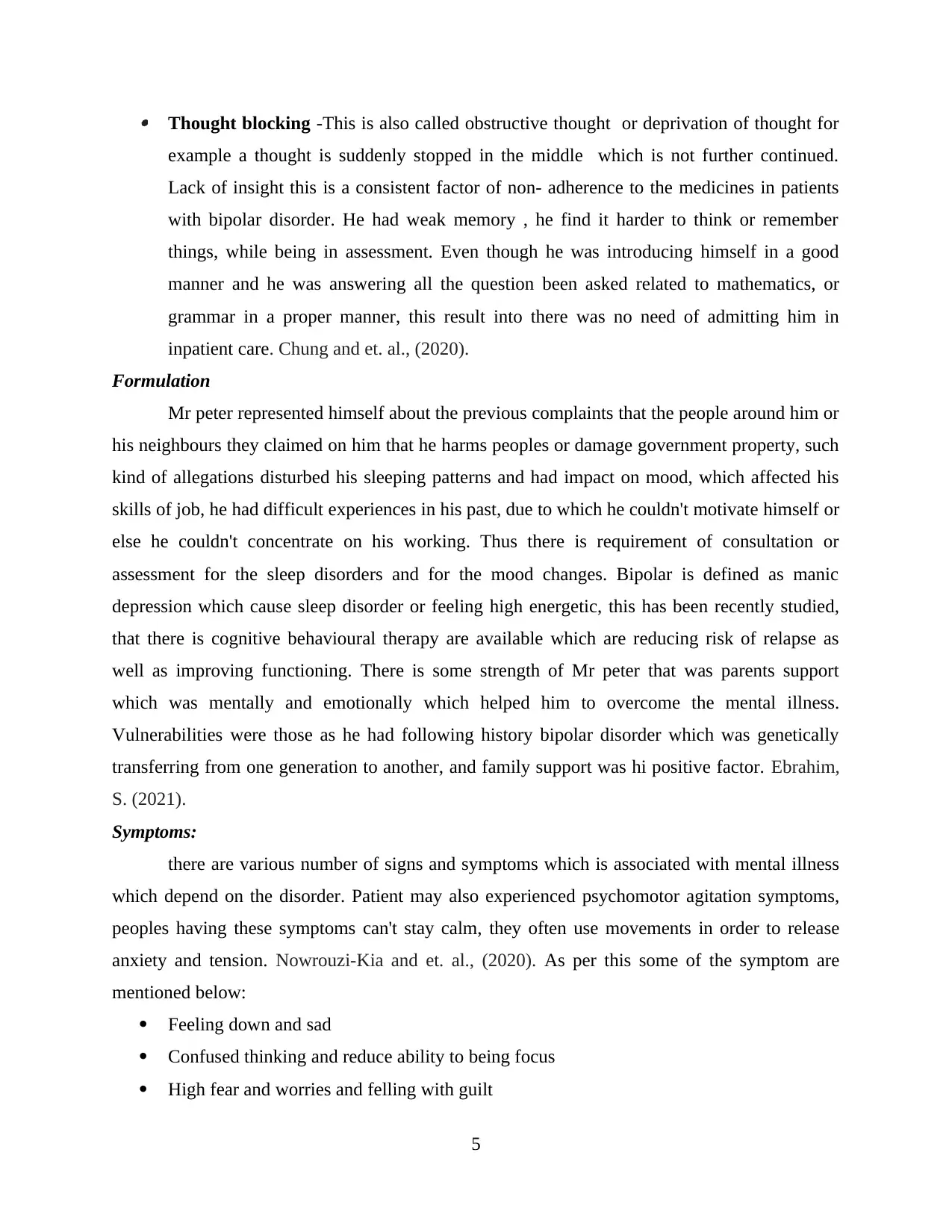
Thought blocking -This is also called obstructive thought or deprivation of thought for
example a thought is suddenly stopped in the middle which is not further continued.
Lack of insight this is a consistent factor of non- adherence to the medicines in patients
with bipolar disorder. He had weak memory , he find it harder to think or remember
things, while being in assessment. Even though he was introducing himself in a good
manner and he was answering all the question been asked related to mathematics, or
grammar in a proper manner, this result into there was no need of admitting him in
inpatient care. Chung and et. al., (2020).
Formulation
Mr peter represented himself about the previous complaints that the people around him or
his neighbours they claimed on him that he harms peoples or damage government property, such
kind of allegations disturbed his sleeping patterns and had impact on mood, which affected his
skills of job, he had difficult experiences in his past, due to which he couldn't motivate himself or
else he couldn't concentrate on his working. Thus there is requirement of consultation or
assessment for the sleep disorders and for the mood changes. Bipolar is defined as manic
depression which cause sleep disorder or feeling high energetic, this has been recently studied,
that there is cognitive behavioural therapy are available which are reducing risk of relapse as
well as improving functioning. There is some strength of Mr peter that was parents support
which was mentally and emotionally which helped him to overcome the mental illness.
Vulnerabilities were those as he had following history bipolar disorder which was genetically
transferring from one generation to another, and family support was hi positive factor. Ebrahim,
S. (2021).
Symptoms:
there are various number of signs and symptoms which is associated with mental illness
which depend on the disorder. Patient may also experienced psychomotor agitation symptoms,
peoples having these symptoms can't stay calm, they often use movements in order to release
anxiety and tension. Nowrouzi-Kia and et. al., (2020). As per this some of the symptom are
mentioned below:
Feeling down and sad
Confused thinking and reduce ability to being focus
High fear and worries and felling with guilt
5
example a thought is suddenly stopped in the middle which is not further continued.
Lack of insight this is a consistent factor of non- adherence to the medicines in patients
with bipolar disorder. He had weak memory , he find it harder to think or remember
things, while being in assessment. Even though he was introducing himself in a good
manner and he was answering all the question been asked related to mathematics, or
grammar in a proper manner, this result into there was no need of admitting him in
inpatient care. Chung and et. al., (2020).
Formulation
Mr peter represented himself about the previous complaints that the people around him or
his neighbours they claimed on him that he harms peoples or damage government property, such
kind of allegations disturbed his sleeping patterns and had impact on mood, which affected his
skills of job, he had difficult experiences in his past, due to which he couldn't motivate himself or
else he couldn't concentrate on his working. Thus there is requirement of consultation or
assessment for the sleep disorders and for the mood changes. Bipolar is defined as manic
depression which cause sleep disorder or feeling high energetic, this has been recently studied,
that there is cognitive behavioural therapy are available which are reducing risk of relapse as
well as improving functioning. There is some strength of Mr peter that was parents support
which was mentally and emotionally which helped him to overcome the mental illness.
Vulnerabilities were those as he had following history bipolar disorder which was genetically
transferring from one generation to another, and family support was hi positive factor. Ebrahim,
S. (2021).
Symptoms:
there are various number of signs and symptoms which is associated with mental illness
which depend on the disorder. Patient may also experienced psychomotor agitation symptoms,
peoples having these symptoms can't stay calm, they often use movements in order to release
anxiety and tension. Nowrouzi-Kia and et. al., (2020). As per this some of the symptom are
mentioned below:
Feeling down and sad
Confused thinking and reduce ability to being focus
High fear and worries and felling with guilt
5
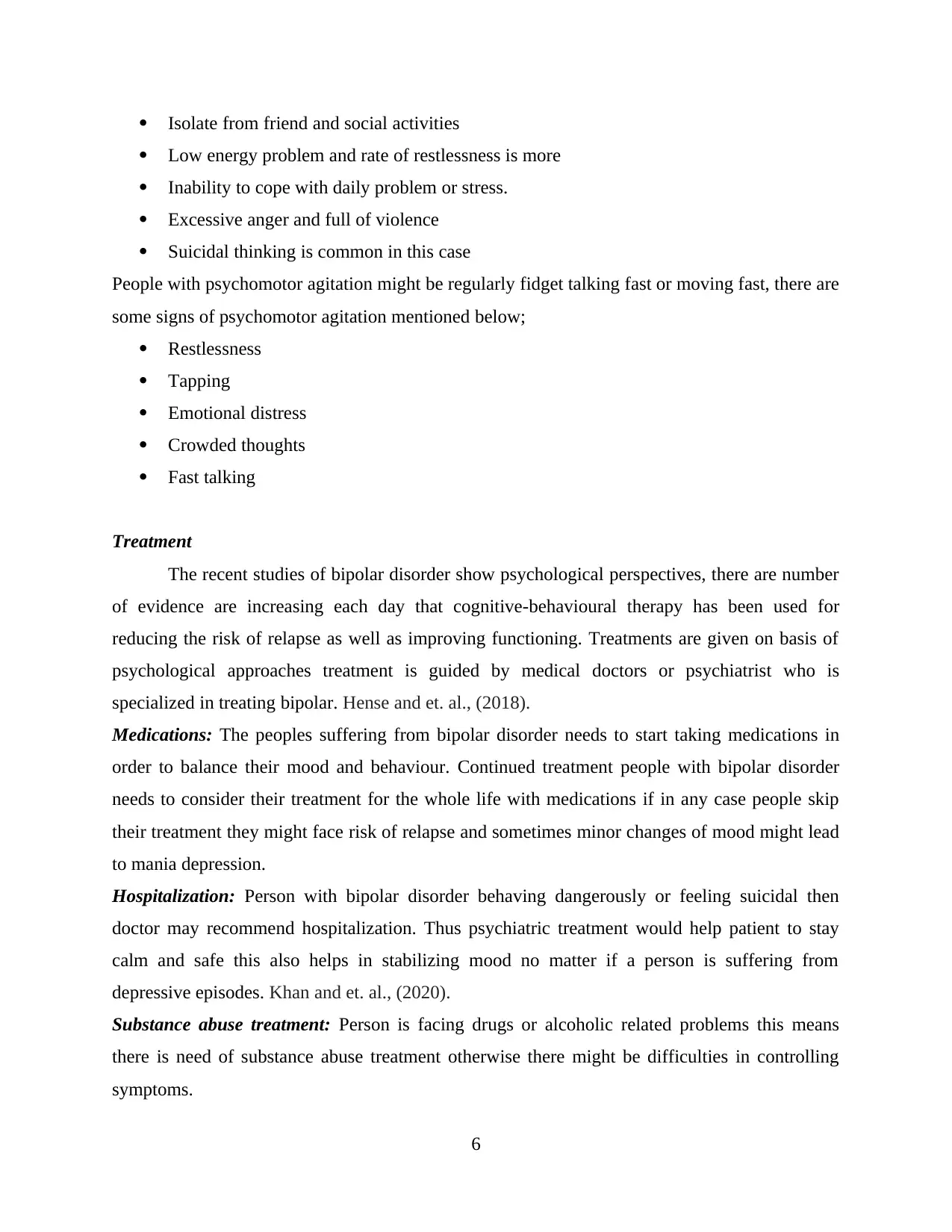
Isolate from friend and social activities
Low energy problem and rate of restlessness is more
Inability to cope with daily problem or stress.
Excessive anger and full of violence
Suicidal thinking is common in this case
People with psychomotor agitation might be regularly fidget talking fast or moving fast, there are
some signs of psychomotor agitation mentioned below;
Restlessness
Tapping
Emotional distress
Crowded thoughts
Fast talking
Treatment
The recent studies of bipolar disorder show psychological perspectives, there are number
of evidence are increasing each day that cognitive-behavioural therapy has been used for
reducing the risk of relapse as well as improving functioning. Treatments are given on basis of
psychological approaches treatment is guided by medical doctors or psychiatrist who is
specialized in treating bipolar. Hense and et. al., (2018).
Medications: The peoples suffering from bipolar disorder needs to start taking medications in
order to balance their mood and behaviour. Continued treatment people with bipolar disorder
needs to consider their treatment for the whole life with medications if in any case people skip
their treatment they might face risk of relapse and sometimes minor changes of mood might lead
to mania depression.
Hospitalization: Person with bipolar disorder behaving dangerously or feeling suicidal then
doctor may recommend hospitalization. Thus psychiatric treatment would help patient to stay
calm and safe this also helps in stabilizing mood no matter if a person is suffering from
depressive episodes. Khan and et. al., (2020).
Substance abuse treatment: Person is facing drugs or alcoholic related problems this means
there is need of substance abuse treatment otherwise there might be difficulties in controlling
symptoms.
6
Low energy problem and rate of restlessness is more
Inability to cope with daily problem or stress.
Excessive anger and full of violence
Suicidal thinking is common in this case
People with psychomotor agitation might be regularly fidget talking fast or moving fast, there are
some signs of psychomotor agitation mentioned below;
Restlessness
Tapping
Emotional distress
Crowded thoughts
Fast talking
Treatment
The recent studies of bipolar disorder show psychological perspectives, there are number
of evidence are increasing each day that cognitive-behavioural therapy has been used for
reducing the risk of relapse as well as improving functioning. Treatments are given on basis of
psychological approaches treatment is guided by medical doctors or psychiatrist who is
specialized in treating bipolar. Hense and et. al., (2018).
Medications: The peoples suffering from bipolar disorder needs to start taking medications in
order to balance their mood and behaviour. Continued treatment people with bipolar disorder
needs to consider their treatment for the whole life with medications if in any case people skip
their treatment they might face risk of relapse and sometimes minor changes of mood might lead
to mania depression.
Hospitalization: Person with bipolar disorder behaving dangerously or feeling suicidal then
doctor may recommend hospitalization. Thus psychiatric treatment would help patient to stay
calm and safe this also helps in stabilizing mood no matter if a person is suffering from
depressive episodes. Khan and et. al., (2020).
Substance abuse treatment: Person is facing drugs or alcoholic related problems this means
there is need of substance abuse treatment otherwise there might be difficulties in controlling
symptoms.
6
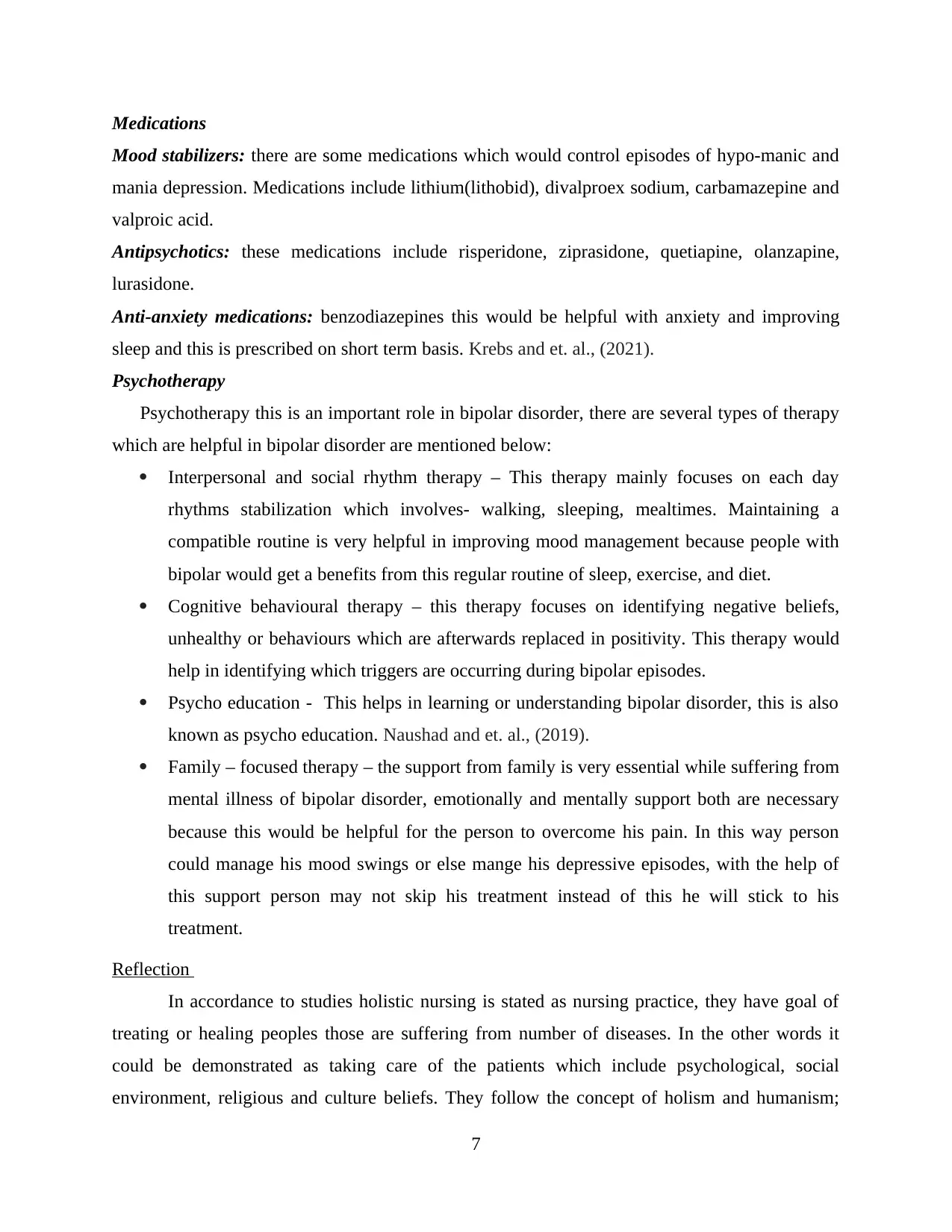
Medications
Mood stabilizers: there are some medications which would control episodes of hypo-manic and
mania depression. Medications include lithium(lithobid), divalproex sodium, carbamazepine and
valproic acid.
Antipsychotics: these medications include risperidone, ziprasidone, quetiapine, olanzapine,
lurasidone.
Anti-anxiety medications: benzodiazepines this would be helpful with anxiety and improving
sleep and this is prescribed on short term basis. Krebs and et. al., (2021).
Psychotherapy
Psychotherapy this is an important role in bipolar disorder, there are several types of therapy
which are helpful in bipolar disorder are mentioned below:
Interpersonal and social rhythm therapy – This therapy mainly focuses on each day
rhythms stabilization which involves- walking, sleeping, mealtimes. Maintaining a
compatible routine is very helpful in improving mood management because people with
bipolar would get a benefits from this regular routine of sleep, exercise, and diet.
Cognitive behavioural therapy – this therapy focuses on identifying negative beliefs,
unhealthy or behaviours which are afterwards replaced in positivity. This therapy would
help in identifying which triggers are occurring during bipolar episodes.
Psycho education - This helps in learning or understanding bipolar disorder, this is also
known as psycho education. Naushad and et. al., (2019).
Family – focused therapy – the support from family is very essential while suffering from
mental illness of bipolar disorder, emotionally and mentally support both are necessary
because this would be helpful for the person to overcome his pain. In this way person
could manage his mood swings or else mange his depressive episodes, with the help of
this support person may not skip his treatment instead of this he will stick to his
treatment.
Reflection
In accordance to studies holistic nursing is stated as nursing practice, they have goal of
treating or healing peoples those are suffering from number of diseases. In the other words it
could be demonstrated as taking care of the patients which include psychological, social
environment, religious and culture beliefs. They follow the concept of holism and humanism;
7
Mood stabilizers: there are some medications which would control episodes of hypo-manic and
mania depression. Medications include lithium(lithobid), divalproex sodium, carbamazepine and
valproic acid.
Antipsychotics: these medications include risperidone, ziprasidone, quetiapine, olanzapine,
lurasidone.
Anti-anxiety medications: benzodiazepines this would be helpful with anxiety and improving
sleep and this is prescribed on short term basis. Krebs and et. al., (2021).
Psychotherapy
Psychotherapy this is an important role in bipolar disorder, there are several types of therapy
which are helpful in bipolar disorder are mentioned below:
Interpersonal and social rhythm therapy – This therapy mainly focuses on each day
rhythms stabilization which involves- walking, sleeping, mealtimes. Maintaining a
compatible routine is very helpful in improving mood management because people with
bipolar would get a benefits from this regular routine of sleep, exercise, and diet.
Cognitive behavioural therapy – this therapy focuses on identifying negative beliefs,
unhealthy or behaviours which are afterwards replaced in positivity. This therapy would
help in identifying which triggers are occurring during bipolar episodes.
Psycho education - This helps in learning or understanding bipolar disorder, this is also
known as psycho education. Naushad and et. al., (2019).
Family – focused therapy – the support from family is very essential while suffering from
mental illness of bipolar disorder, emotionally and mentally support both are necessary
because this would be helpful for the person to overcome his pain. In this way person
could manage his mood swings or else mange his depressive episodes, with the help of
this support person may not skip his treatment instead of this he will stick to his
treatment.
Reflection
In accordance to studies holistic nursing is stated as nursing practice, they have goal of
treating or healing peoples those are suffering from number of diseases. In the other words it
could be demonstrated as taking care of the patients which include psychological, social
environment, religious and culture beliefs. They follow the concept of holism and humanism;
7
Paraphrase This Document
Need a fresh take? Get an instant paraphrase of this document with our AI Paraphraser
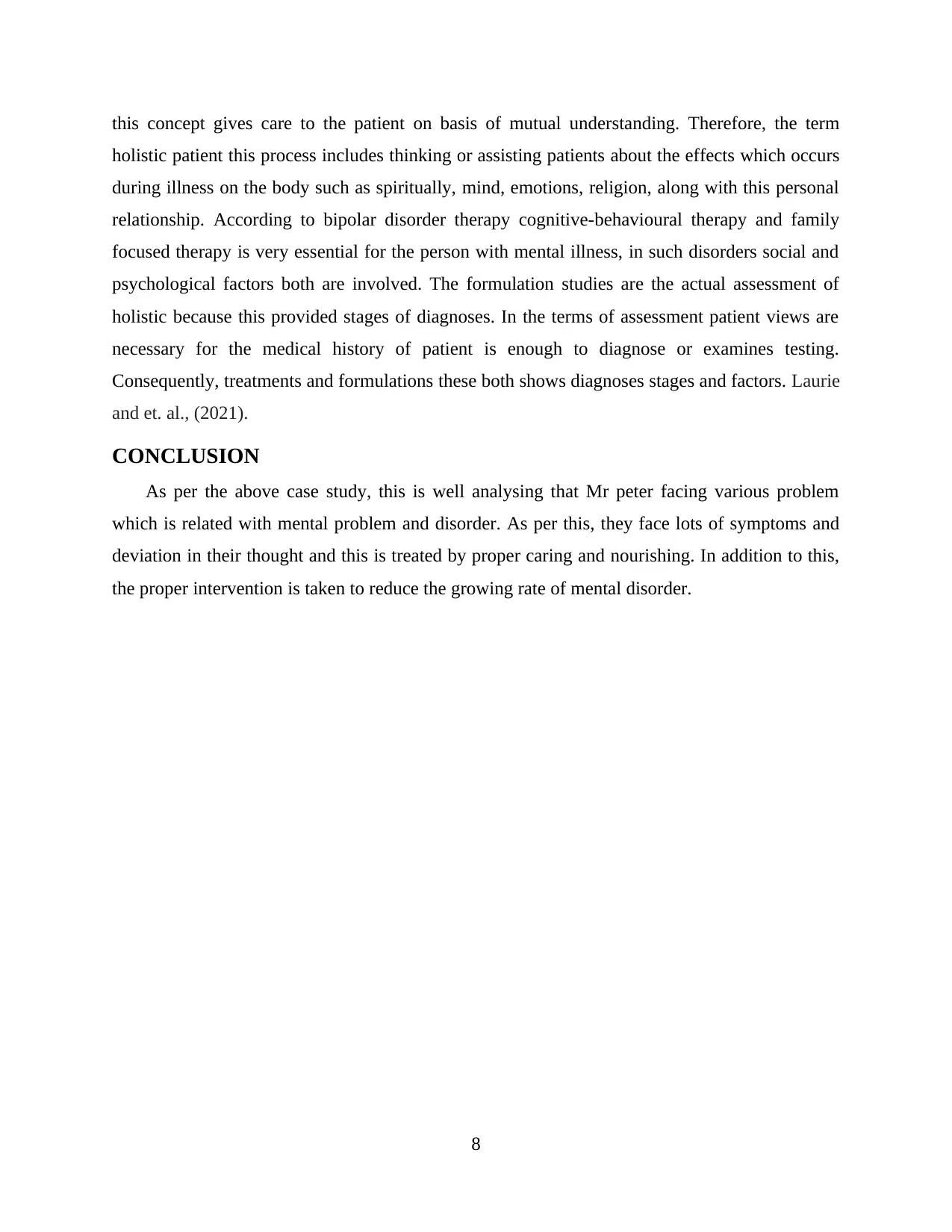
this concept gives care to the patient on basis of mutual understanding. Therefore, the term
holistic patient this process includes thinking or assisting patients about the effects which occurs
during illness on the body such as spiritually, mind, emotions, religion, along with this personal
relationship. According to bipolar disorder therapy cognitive-behavioural therapy and family
focused therapy is very essential for the person with mental illness, in such disorders social and
psychological factors both are involved. The formulation studies are the actual assessment of
holistic because this provided stages of diagnoses. In the terms of assessment patient views are
necessary for the medical history of patient is enough to diagnose or examines testing.
Consequently, treatments and formulations these both shows diagnoses stages and factors. Laurie
and et. al., (2021).
CONCLUSION
As per the above case study, this is well analysing that Mr peter facing various problem
which is related with mental problem and disorder. As per this, they face lots of symptoms and
deviation in their thought and this is treated by proper caring and nourishing. In addition to this,
the proper intervention is taken to reduce the growing rate of mental disorder.
8
holistic patient this process includes thinking or assisting patients about the effects which occurs
during illness on the body such as spiritually, mind, emotions, religion, along with this personal
relationship. According to bipolar disorder therapy cognitive-behavioural therapy and family
focused therapy is very essential for the person with mental illness, in such disorders social and
psychological factors both are involved. The formulation studies are the actual assessment of
holistic because this provided stages of diagnoses. In the terms of assessment patient views are
necessary for the medical history of patient is enough to diagnose or examines testing.
Consequently, treatments and formulations these both shows diagnoses stages and factors. Laurie
and et. al., (2021).
CONCLUSION
As per the above case study, this is well analysing that Mr peter facing various problem
which is related with mental problem and disorder. As per this, they face lots of symptoms and
deviation in their thought and this is treated by proper caring and nourishing. In addition to this,
the proper intervention is taken to reduce the growing rate of mental disorder.
8
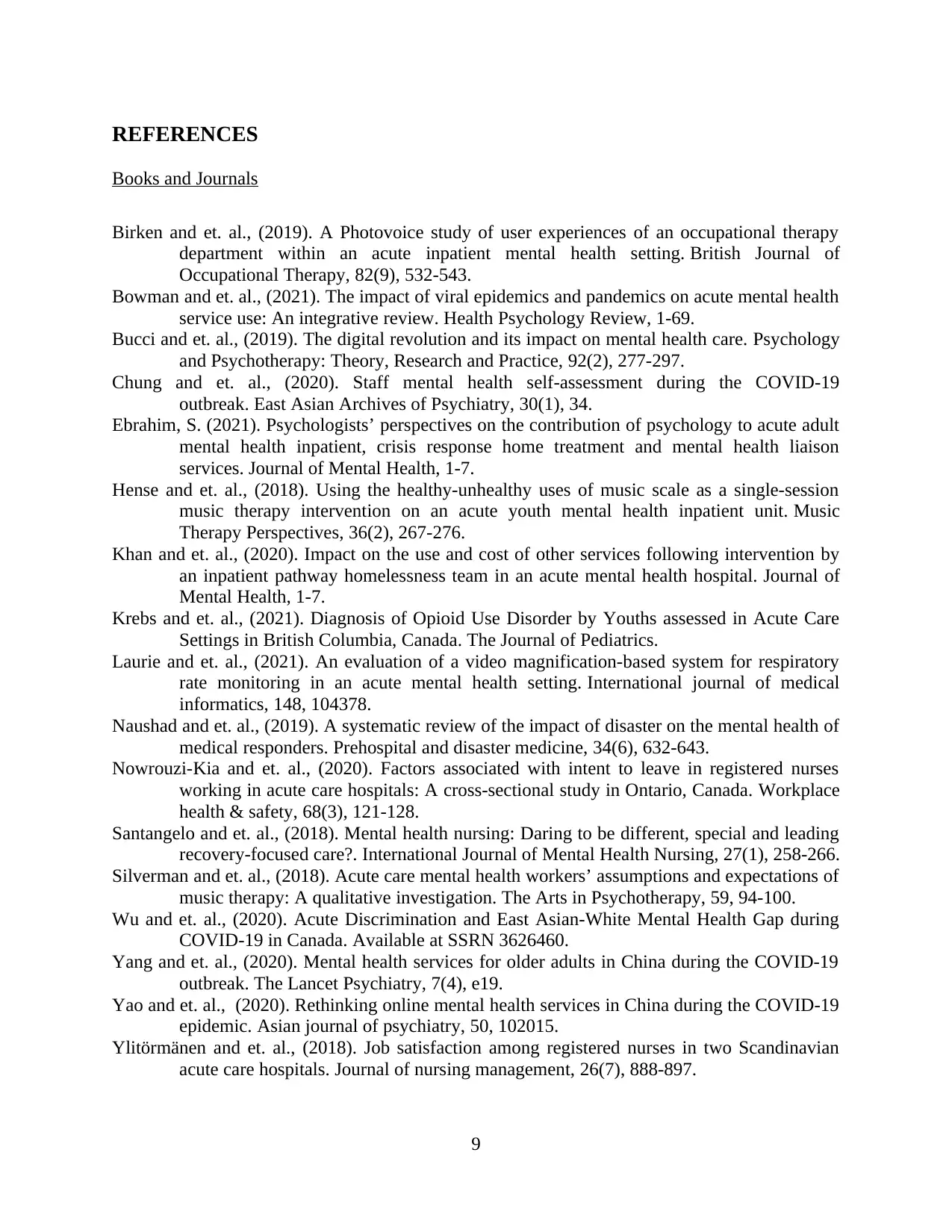
REFERENCES
Books and Journals
Birken and et. al., (2019). A Photovoice study of user experiences of an occupational therapy
department within an acute inpatient mental health setting. British Journal of
Occupational Therapy, 82(9), 532-543.
Bowman and et. al., (2021). The impact of viral epidemics and pandemics on acute mental health
service use: An integrative review. Health Psychology Review, 1-69.
Bucci and et. al., (2019). The digital revolution and its impact on mental health care. Psychology
and Psychotherapy: Theory, Research and Practice, 92(2), 277-297.
Chung and et. al., (2020). Staff mental health self-assessment during the COVID-19
outbreak. East Asian Archives of Psychiatry, 30(1), 34.
Ebrahim, S. (2021). Psychologists’ perspectives on the contribution of psychology to acute adult
mental health inpatient, crisis response home treatment and mental health liaison
services. Journal of Mental Health, 1-7.
Hense and et. al., (2018). Using the healthy-unhealthy uses of music scale as a single-session
music therapy intervention on an acute youth mental health inpatient unit. Music
Therapy Perspectives, 36(2), 267-276.
Khan and et. al., (2020). Impact on the use and cost of other services following intervention by
an inpatient pathway homelessness team in an acute mental health hospital. Journal of
Mental Health, 1-7.
Krebs and et. al., (2021). Diagnosis of Opioid Use Disorder by Youths assessed in Acute Care
Settings in British Columbia, Canada. The Journal of Pediatrics.
Laurie and et. al., (2021). An evaluation of a video magnification-based system for respiratory
rate monitoring in an acute mental health setting. International journal of medical
informatics, 148, 104378.
Naushad and et. al., (2019). A systematic review of the impact of disaster on the mental health of
medical responders. Prehospital and disaster medicine, 34(6), 632-643.
Nowrouzi-Kia and et. al., (2020). Factors associated with intent to leave in registered nurses
working in acute care hospitals: A cross-sectional study in Ontario, Canada. Workplace
health & safety, 68(3), 121-128.
Santangelo and et. al., (2018). Mental health nursing: Daring to be different, special and leading
recovery‐focused care?. International Journal of Mental Health Nursing, 27(1), 258-266.
Silverman and et. al., (2018). Acute care mental health workers’ assumptions and expectations of
music therapy: A qualitative investigation. The Arts in Psychotherapy, 59, 94-100.
Wu and et. al., (2020). Acute Discrimination and East Asian-White Mental Health Gap during
COVID-19 in Canada. Available at SSRN 3626460.
Yang and et. al., (2020). Mental health services for older adults in China during the COVID-19
outbreak. The Lancet Psychiatry, 7(4), e19.
Yao and et. al., (2020). Rethinking online mental health services in China during the COVID-19
epidemic. Asian journal of psychiatry, 50, 102015.
Ylitörmänen and et. al., (2018). Job satisfaction among registered nurses in two Scandinavian
acute care hospitals. Journal of nursing management, 26(7), 888-897.
9
Books and Journals
Birken and et. al., (2019). A Photovoice study of user experiences of an occupational therapy
department within an acute inpatient mental health setting. British Journal of
Occupational Therapy, 82(9), 532-543.
Bowman and et. al., (2021). The impact of viral epidemics and pandemics on acute mental health
service use: An integrative review. Health Psychology Review, 1-69.
Bucci and et. al., (2019). The digital revolution and its impact on mental health care. Psychology
and Psychotherapy: Theory, Research and Practice, 92(2), 277-297.
Chung and et. al., (2020). Staff mental health self-assessment during the COVID-19
outbreak. East Asian Archives of Psychiatry, 30(1), 34.
Ebrahim, S. (2021). Psychologists’ perspectives on the contribution of psychology to acute adult
mental health inpatient, crisis response home treatment and mental health liaison
services. Journal of Mental Health, 1-7.
Hense and et. al., (2018). Using the healthy-unhealthy uses of music scale as a single-session
music therapy intervention on an acute youth mental health inpatient unit. Music
Therapy Perspectives, 36(2), 267-276.
Khan and et. al., (2020). Impact on the use and cost of other services following intervention by
an inpatient pathway homelessness team in an acute mental health hospital. Journal of
Mental Health, 1-7.
Krebs and et. al., (2021). Diagnosis of Opioid Use Disorder by Youths assessed in Acute Care
Settings in British Columbia, Canada. The Journal of Pediatrics.
Laurie and et. al., (2021). An evaluation of a video magnification-based system for respiratory
rate monitoring in an acute mental health setting. International journal of medical
informatics, 148, 104378.
Naushad and et. al., (2019). A systematic review of the impact of disaster on the mental health of
medical responders. Prehospital and disaster medicine, 34(6), 632-643.
Nowrouzi-Kia and et. al., (2020). Factors associated with intent to leave in registered nurses
working in acute care hospitals: A cross-sectional study in Ontario, Canada. Workplace
health & safety, 68(3), 121-128.
Santangelo and et. al., (2018). Mental health nursing: Daring to be different, special and leading
recovery‐focused care?. International Journal of Mental Health Nursing, 27(1), 258-266.
Silverman and et. al., (2018). Acute care mental health workers’ assumptions and expectations of
music therapy: A qualitative investigation. The Arts in Psychotherapy, 59, 94-100.
Wu and et. al., (2020). Acute Discrimination and East Asian-White Mental Health Gap during
COVID-19 in Canada. Available at SSRN 3626460.
Yang and et. al., (2020). Mental health services for older adults in China during the COVID-19
outbreak. The Lancet Psychiatry, 7(4), e19.
Yao and et. al., (2020). Rethinking online mental health services in China during the COVID-19
epidemic. Asian journal of psychiatry, 50, 102015.
Ylitörmänen and et. al., (2018). Job satisfaction among registered nurses in two Scandinavian
acute care hospitals. Journal of nursing management, 26(7), 888-897.
9

10
Secure Best Marks with AI Grader
Need help grading? Try our AI Grader for instant feedback on your assignments.

11
1 out of 11
Related Documents
Your All-in-One AI-Powered Toolkit for Academic Success.
+13062052269
info@desklib.com
Available 24*7 on WhatsApp / Email
![[object Object]](/_next/static/media/star-bottom.7253800d.svg)
Unlock your academic potential
© 2024 | Zucol Services PVT LTD | All rights reserved.





